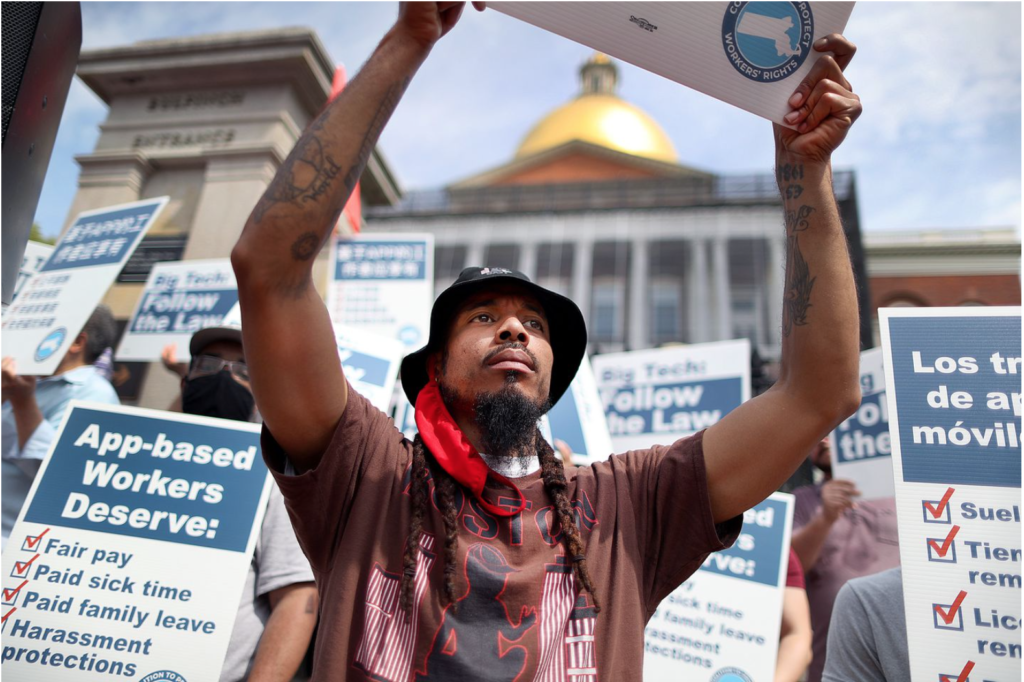By Globe Staff,Updated June 22, 2021, 6:26 p.m.
A fight that became the most expensive ballot measure in California’s history has arrived in full force in Massachusetts, setting the stage for a potentially costly campaign that could reshape the state’s labor law and how hundreds of thousands of workers operate under it.
The question of whether Uber drivers, DoorDash delivery people, and other so-called gig economy workers should be classified as independent contractors or employees has already reared its head in litigation and at the State House, where a bill backed by the major ride-hailing companies is working through Beacon Hill’s legislative gears.
But the emergence of two similarly named but opposing coalitions — each claiming the backing of app-based workers — is seeding a potential ballot question fight next fall, when voters could be asked to decide how the workers should be treated.
“Massachusetts is going to be ground zero for the next wave of this fight,” said Shannon Liss-Riordan, a labor attorney and former US Senate candidate who rallied with labor officials and advocates Tuesday as part of the newly formed Coalition to Protect Workers’ Rights.
It’s a question California residents decided last year following a divisive battle, with labor officials on one side and ride-hailing and delivery companies on the other, in which they fueled a $201 million petition initiative campaign that was the most expensive in the state’s history.
Voters ultimately sided with the technology companies, allowing them to continue to treat drivers as independent contractors under a California law that would have forced the companies to hire the drivers as employees, including paying for health care coverage. The measure instead gave gig-economy workers some benefits, including minimum pay.
After the vote, the chief executive of DoorDash said it would be “looking ahead and across the country” to push similar proposals.
Major tech industry players are now organizing here under the banner of the Massachusetts Coalition for Independent Work, which also includes the Massachusetts High Technology Council and Urban League of Eastern Massachusetts. It has brought on a public relations firm that was involved in the unsuccessful effort to beat back a ballot question last year that expanded the state’s “Right to Repair” law, itself a $50.7 million campaign that stands as the most expensive in Massachusetts history.
The coalition is currently supporting a bill that would designate all app-based drivers as independent contractors, while creating a so-called portable benefits account for some drivers.
Under the proposal, a ride-hailing company would pay a contribution into the account equal to 4 percent of the driver’s earnings from the previous three-month quarter, which the worker could then use toward health care costs, a retirement fund, or to help cover lost income because of an injury, for example.
Representative Carlos González, a Springfield Democrat who is cosponsoring the bill, said lawmakers who wrote the legislation “looked at” the California initiative, but focused on providing a “third alternative” in the debate over whether these workers should be employees or independent contractors.
“It’s not to say that every company needs to offer this or every employee needs to accept this,” he said. “But as a representative of many workers who are in the gig economy, they do not want to be employed by anybody. But I understand there needs to be protections in place.”
Should the companies pursue a ballot question, the first official signal would have to come by Aug. 4, when petitioners must submit 10 signatures to Attorney General Maura Healey’s office. From there, they’d have to collect and submit 80,239 more to local officials by mid-November to continue moving toward the ballot in 2022.
“We remain very focused on the legislative process, and we believe that’s the best path forward,” said Conor Yunits, a senior vice president at Solomon McCown & Cence who is a spokesman for the coalition. But, he added: “Obviously we do have our eye on the calendar.”
Uber deferred to the coalition for comment Tuesday. Lyft and DoorDash did not respond to requests for comment.
Should it pursue an initiative petition, the coalition is all but guaranteed to face a fiery opposition campaign from labor officials and advocates, whose launch Tuesday of the opposing Coalition to Protect Workers’ Rights was framed as a preemptive push against a potential ballot question.
Labor advocates have said that a 2004 Massachusetts law makes clear that workers are to be classified as employees if they are being directed by the company that hires them, are working within the normal scope of the business, or are doing a job that is not part of an independently established occupation.
Healey, a Charlestown Democrat, last year sued Uber and Lyft, claiming they were misclassifying drivers in violation of state law. The case is pending.
“These companies would rather spend a $100 million changing the law to deny workers basic rights than to reimburse a driver for a tank of gas,” Mike Firestone, who served for nearly four years as Healey’s chief of staff and is now heading the coalition, said Tuesday at a rally outside the State House. The event included leaders of the Massachusetts AFL-CIO, the Massachusetts Teachers Association, and other advocacy groups.
“This is a big fight. We did not ask for it, but we are going to take it on,” Firestone said.
Hours later, the tech-backed Coalition for Independent Work held its own virtual event with a handful of ride-hail and delivery drivers, each of whom echoed a similar narrative: By remaining a contractor, they’re able to keep more independence in their schedule to decide when to work.
“If we become employees, there goes all of our flexibility . . . You’re no longer your own boss,” said Travis Jones, an UberEats driver who spoke at the group’s event.
Labor advocates argue it’s a false choice between having flexibility and greater access to benefits, setting up a narrative that’s likely to run through any ballot question campaign.
“Do not be fooled, folks,” said Steven Tolman, a former state senator and president of the Massachusetts AFL-CIO. “The model that big tech brought to California through Proposition 22 and [is] now attempting to bring to Massachusetts does nothing more than to allow them . . . to skirt the laws.”

